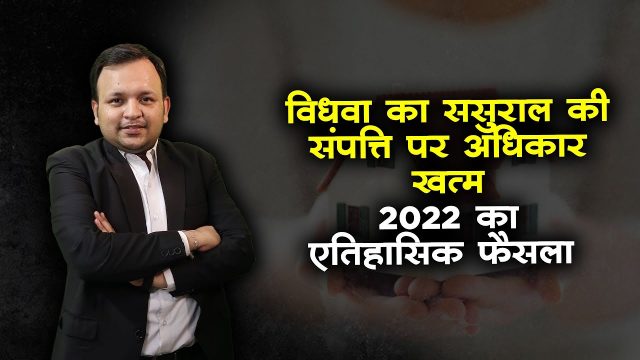Introduction
In India, a large portion of the widows is uninformed about their rights such as rights regarding property, coparcenary, inheritance, etc. Even though the rights recommended in Hindu law texts in various frameworks, for example, Mitakshara and Dayabhaga are increasingly unfortunate for women, many changes have been made in the current laws, for example, The Hindu Women’s Right to Property Act, 1937, Hindu Succession (Amendment) Act, 2005, The Hindu Succession Act, 1956 and so on. The changes include the amendment in Hindu Succession (Amendment) Act, 2005 which has given absolute interest as a coparcener.
A wife has a right on the property of the husband, even if they are living separately the wife can claim maintenance. In the case of the death of the husband, the wife can claim the right to reside at the in-law’s place but can she claim ownership over the property? This is explained with the help of important judgment in subsequent paragraphs.
Landmark Judgment of Laxmi & Anr. vs Shyam Pratap & Anr. 18.04.2022
Brief facts of the case
An application was filed under Section 19 of the Hindu Adoption and Maintenance Act, 1956 for claiming interim maintenance and ownership rights on the property from the parents of her deceased husband by the daughter-in-law and granddaughter alleging that after the death of her husband she started living with her parents and that she was not well educated and had no source of income to maintain herself or the daughter. She is dependent upon her old-age ailing parents for her day-to-day needs. Further, the in-laws have intentionally and deliberately neglected them by not paying even a penny towards their maintenance.
The in-laws, on the other hand, had asserted that the daughter-in-law and granddaughter are not entitled to any maintenance under Section 19 of the Act since there was no estate left behind by the deceased and neither has any coparcenary property nor any income therefrom.
Therefore, the Learned Principal Judge, Family Court, observed that the applicant had failed to disclose any estate left behind by her husband to the in-laws from which the applicant could claim maintenance. The application was accordingly dismissed.
D.B. Appeal under Section 19 of the Family Court Act, 1984
Aggrieved by the order of the learned Family Court, D.B. appeal was filed under Section 19 of the Family Court Act, 1984. One main point of consideration before the Learned Court was whether the Widow can claim ownership rights over the property of in-laws after the husband’s death. To decide the same two important Sections were perused i.e. Section 19 & 22 of the Hindu Adoption and Maintenance Act, 1956,
Section 19: Maintenance of widowed daughter-in-law
(1) A Hindu wife, whether married before or after the commencement of this Act, shall be entitled to be maintained after the death of her husband by her father-in-law:
PROVIDED and to the extent that she is unable to maintain herself out of her own earnings or other property or, where she has no property of her own, is unable to obtain maintenance-
(a) from the estate of her husband or her father or mother, or
(b) from her son or daughter, if any, or his or her estate.
(2) Any obligation under sub-section (1) shall not be enforceable if the father-in-law has not the means to do so from any coparcenary property in his possession out of which the daughter-in-law has not obtained any share, and any such obligation shall cease on the re-marriage of the daughter-in-law.
Section 22: Maintenance of dependants
(1) Subject to the provisions of sub-section (2) the heirs of a deceased Hindu are bound to maintain the dependants of the deceased out of the estate inherited by them from the deceased.
(2) Where a dependant has not obtained, by testamentary or intestate succession, any share in the estate of a Hindu dying after the commencement of this Act, the defendant shall be entitled, subject to the provisions of this Act, to maintenance from those who take the estate.
(3) The liability of each of the persons who take the estate shall be in proportion to the value of the share or part of the estate taken by him or her.
(4) Notwithstanding anything contained in sub-section (2) or sub-section (3), no person who is himself or herself a dependant shall be liable to contribute to the maintenance of others if he or she has obtained a share or part of the value of which is, or would, if the liability to contribute were enforced, become less than what would be awarded to him or her by way of maintenance under this Act.
On the bare perusal of the above-mentioned two sections it is confirmed that two conditions need to be satisfied by the Widow to claim rights in the property of in-laws which are:
- There has to be no source of income whatsoever,
- The property in which the widow wants to claim her right should be a property acquired by the in-laws from the husband of the Widow and not a self-acquired property of the in-laws.
In the above-mentioned case, the applicant was successful to prove the condition no. 1 but failed to prove condition no. 2 as the in-laws were successful in proving that the property in which the widow was demanding a right was self-acquired property of the father-in-law and there was no share of the deceased in it. Hence, the appeal was dismissed.
Conclusion
The woman can claim the right to residence in the in-law’s property after the death of her husband but to claim ownership of the property of in-laws the provisions mentioned in Section 19 and 22 of the Hindu Adoption and Maintenance Act, 1956 are compulsory to be proven in absence of which no right can be claimed.
Feel free to connect with us, for a better understanding of legal concepts!
If still doubts persist, consult legal experts at












